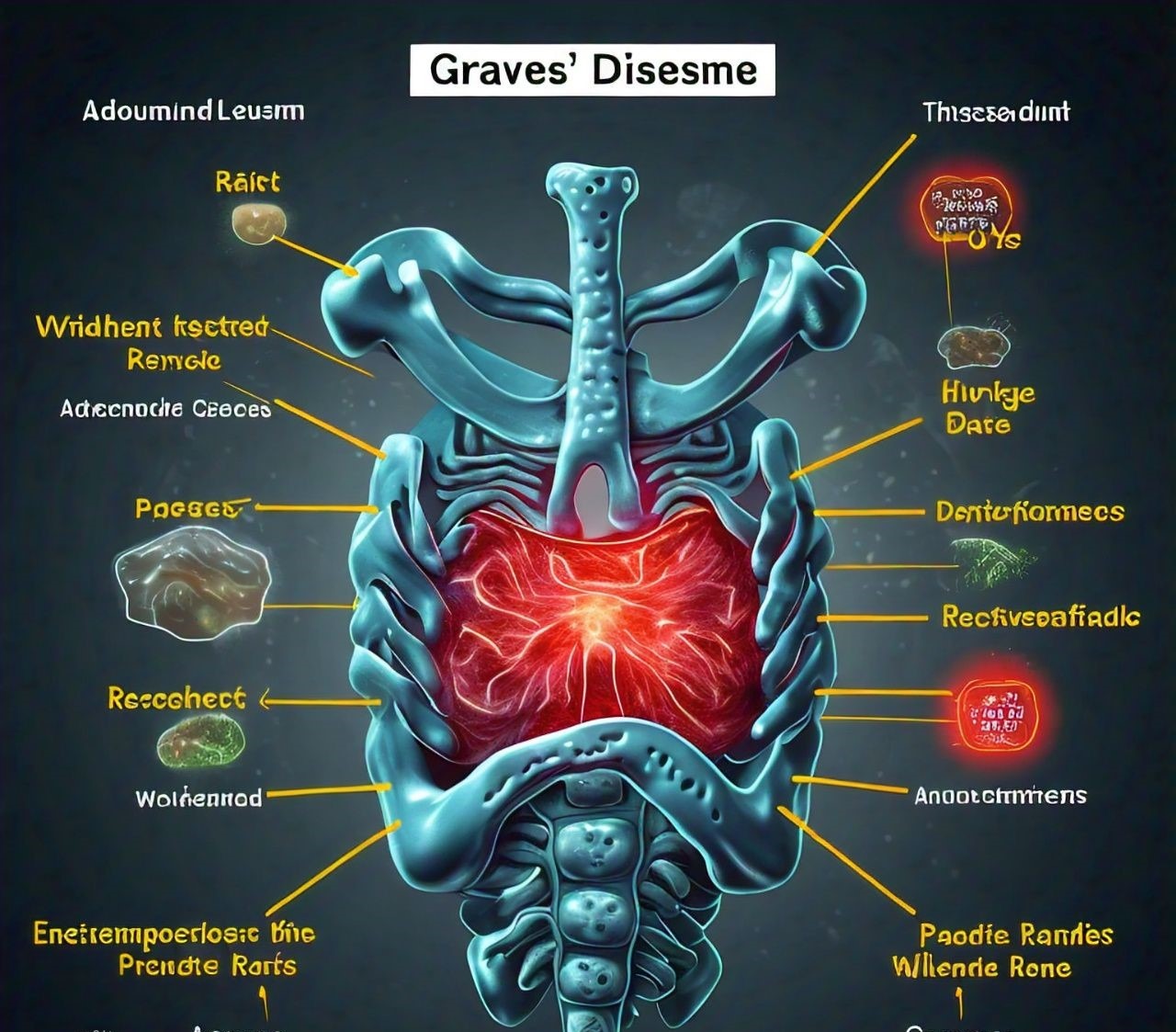Introduction
Graves Disease is one of the most common autoimmune disorders affecting the thyroid gland, and it significantly impacts a person’s overall health and quality of life. Despite advances in understanding the disease, many individuals remain unaware of its symptoms, causes, and the latest treatment options. In this blog post, we will delve deeply into the various aspects of Graves Disease, providing a comprehensive guide on its symptoms, causes, and the new treatment options available today. We will also touch on its complications, risk factors, diagnosis, and how people can cope with living with this condition.
What is Graves Disease?
Graves Disease is an autoimmune disorder where the immune system mistakenly attacks the thyroid gland, leading to an overproduction of thyroid hormones. The condition is the most common cause of hyperthyroidism, which occurs when the thyroid is overactive. The thyroid is a small gland located at the base of the neck and plays a crucial role in regulating metabolism, heart rate, and energy levels.
Graves Disease can cause a wide array of symptoms that affect both physical and mental well-being. If left untreated, it can lead to severe health problems. However, with early diagnosis and the proper treatment, most people with Graves Disease can lead healthy lives.
Symptoms of Graves Disease
Understanding the symptoms of Graves Disease is essential for early diagnosis and treatment. The symptoms vary from person to person, but they are primarily due to the overproduction of thyroid hormones.
Common Symptoms of Graves Disease
- Weight Loss
One of the hallmark symptoms of Graves Disease is unintentional weight loss, despite an increased appetite. As the thyroid speeds up metabolism, individuals may find themselves eating more but losing weight rapidly. This can be alarming and often prompts medical attention. - Increased Heart Rate (Tachycardia)
Many people with Graves Disease experience an elevated heart rate. Tachycardia, or a resting heart rate over 100 beats per minute, is a common sign. In severe cases, it may lead to atrial fibrillation, an irregular heartbeat that can increase the risk of stroke. - Anxiety and Irritability
Thyroid hormones affect brain function, and when they are overproduced, it can result in nervousness, anxiety, and irritability. Some individuals report feeling restless and have trouble concentrating. Emotional instability is also common, with sudden mood swings or depression. - Heat Sensitivity and Excessive Sweating
People with Graves Disease often have difficulty tolerating heat. This heat intolerance is coupled with excessive sweating, even in cool environments. It is the body’s way of responding to an elevated metabolic rate. - Graves’ Ophthalmopathy (Eye Problems)
A unique feature of Graves Disease is Graves’ ophthalmopathy, which affects around 30% of individuals with the disease. Symptoms include bulging eyes (proptosis), dryness, irritation, light sensitivity, and in more severe cases, vision loss. These eye issues are caused by inflammation and swelling of the tissues behind the eyes.
| Symptom | Description |
|---|---|
| Weight Loss | Unintentional weight loss despite increased appetite |
| Tachycardia | Resting heart rate over 100 bpm, risk of atrial fibrillation |
| Anxiety/Irritability | Nervousness, emotional instability, and mood swings |
| Heat Sensitivity | Difficulty tolerating heat, excessive sweating |
| Eye Problems | Bulging eyes, dryness, light sensitivity, vision issues |
Less Common Symptoms of Graves Disease
- Skin Thickening (Pretibial Myxedema)
This is a rare but characteristic sign of Graves Disease where the skin, particularly on the shins, becomes thick, red, and rough. This condition, known as pretibial myxedema, can be uncomfortable but is usually not painful. - Fatigue and Muscle Weakness
Despite the overactivity of the thyroid, many patients experience muscle weakness and fatigue. Simple tasks, such as climbing stairs, can become exhausting. - Sleep Disturbances
People with Graves Disease often report insomnia or disturbed sleep due to anxiety, restlessness, and a racing heart. - Menstrual Irregularities
For women, Graves Disease can lead to irregular menstrual cycles or even missed periods, as thyroid hormones interact with reproductive hormones.
Causes of Graves Disease
What Triggers Graves Disease?
The exact cause of Graves Disease is not fully understood, but it is believed to be a combination of genetic and environmental factors.
- Autoimmune Response
Like other autoimmune disorders, Graves Disease occurs when the immune system produces antibodies that mistakenly target the thyroid gland. Specifically, the antibodies, known as thyroid-stimulating immunoglobulins (TSI), bind to the thyroid-stimulating hormone (TSH) receptors on the thyroid gland, causing the gland to overproduce thyroid hormones. - Genetic Predisposition
Family history plays a significant role. Individuals with a family history of autoimmune diseases are at a higher risk of developing Graves Disease. Research has identified specific genes that increase susceptibility to the disorder. - Environmental Triggers
- Stress: Emotional or physical stress is a known trigger for the onset of Graves Disease.
- Smoking: Smoking has been linked to an increased risk of developing Graves’ ophthalmopathy.
- Infections: Certain infections may trigger the autoimmune response that leads to Graves Disease.
How Does Graves Disease Affect the Thyroid Gland?
Graves Disease causes the thyroid to become overactive, leading to the release of excessive amounts of thyroid hormones (T3 and T4). This overproduction causes the body’s metabolism to increase, resulting in symptoms such as weight loss, rapid heart rate, and nervousness.
Risk Factors for Graves Disease
Who is Most at Risk for Graves Disease?
Several factors increase the likelihood of developing Graves Disease:
- Gender
Women are much more likely to develop Graves Disease than men. It is estimated that women are seven times more likely to be affected than men. Hormonal changes during pregnancy, menopause, or birth control use may be contributing factors. - Age
Graves Disease can occur at any age, but it is most commonly diagnosed in people between the ages of 20 and 40. However, older adults are also at risk and may present with different symptoms, such as fatigue and weight gain. - Other Autoimmune Diseases
People with other autoimmune disorders, such as Type 1 diabetes, rheumatoid arthritis, or lupus, are at an increased risk of developing Graves Disease.
| Risk Factor | Details |
|---|---|
| Gender | Women are more affected than men (7x more likely) |
| Age | Most common between ages 20-40 |
| Autoimmune Conditions | Higher risk for individuals with other autoimmune diseases |
How is Graves Disease Diagnosed?
What Tests Diagnose Graves Disease?
Diagnosing Graves Disease involves a combination of clinical evaluation and laboratory tests.
- Physical Examination
During a physical exam, doctors will look for signs such as an enlarged thyroid (goiter), bulging eyes, and a rapid pulse. These physical indicators are often the first clue. - Thyroid Function Tests
Blood tests are critical in confirming the diagnosis of Graves Disease. The tests measure levels of thyroid hormones (T3 and T4) and thyroid-stimulating hormone (TSH). In Graves Disease, T3 and T4 are elevated, while TSH is suppressed. - Radioactive Iodine Uptake Test
This test evaluates how much iodine the thyroid takes up. A high uptake suggests hyperthyroidism due to Graves Disease.
Complications of Graves Disease
Long-Term Complications of Untreated Graves Disease
If Graves Disease is left untreated, it can lead to serious complications, including:
- Heart Problems
Untreated Graves Disease increases the risk of atrial fibrillation (an irregular, rapid heart rate), which can lead to heart failure. - Osteoporosis
Excessive thyroid hormones interfere with calcium absorption, leading to bone loss and an increased risk of osteoporosis. - Thyroid Storm
In rare cases, Graves Disease can lead to a life-threatening condition called thyroid storm, where the body’s metabolism speeds up to dangerous levels, causing fever, rapid heart rate, and delirium.
Mental Health Complications
Graves Disease can have profound effects on mental health, leading to anxiety, depression, and cognitive difficulties. Emotional instability and mood swings are common, particularly if the condition is untreated.
Treatment Options for Graves Disease
Conventional Treatments for Graves Disease
- Antithyroid Medications
Drugs like methimazole and propylthiouracil are used to block the thyroid’s ability to produce hormones. These medications can provide symptom relief but require monitoring for side effects. - Radioactive Iodine Therapy
Radioactive iodine therapy involves swallowing a pill that contains radioactive iodine, which destroys part of the thyroid gland, reducing its hormone production. - Surgery
In some cases, removing part or all of the thyroid gland is necessary. Surgery is usually recommended when other treatments fail or when there is a large goiter.
New and Emerging Treatments for Graves Disease
- Biologic Therapies
Recent studies have explored the use of biologic drugs to target the specific immune responses that cause Graves Disease. These therapies hold promise for treating Graves’ ophthalmopathy and other autoimmune aspects of the disease. - Targeted Immunotherapies
Immunotherapy is another emerging field, focusing on modifying the immune system’s response to the thyroid gland. While still in experimental stages, early trials have shown promising results in reducing symptoms and preventing relapses.
Conclusion
Graves Disease is a complex autoimmune disorder with far-reaching effects on the body. Understanding the symptoms, causes, and the latest treatment options is essential for managing the condition. Early diagnosis and intervention can prevent severe complications and improve the quality of life for individuals living with Graves Disease.
While traditional treatments remain effective, new therapies offer hope for better management and even potential cures in the future. Staying informed and working closely with healthcare providers are critical steps in navigating life with Graves Disease.
For more information on fitness and health, check out these resources:
Explore more articles on our site:
- How to Increase Running Stamina for Beginners at Home
- What Happens if You Don’t Get Enough Sleep Consistently: Effects and Solutions
- The Ultimate Guide to Healthy Living in 2024
- The Future of Artificial Intelligence: What to Expect
- Unlocking the Potential of Chat GPT Software: Revolutionizing AI Conversations
- Best Sleeping Position for Peripheral Artery Disease [New 2024]
- How to Increase Running Stamina for Beginners at Home
- 5 New Inner Thigh Exercises for Men and Women




